Microsoft SQL Server
Microsoft SQL Server is a database from Microsoft.
Integrations and Connectors
AgilePoint NX integrates in these ways with Microsoft SQL Server:
- Activities in Process Builder
- Lookups in eForm Builder
- Data source for process-based apps
- Data source for form-based apps
- AgilePoint Databases
- Automated Actions Based on Database Events (Event Service)
- Access tokens
Activities in Process Builder
You can use a SQL Server database with the out-of-the-box Database activities to execute actions in process-based apps.
An activity is a functional unit, or task, in a process-based app. Activities that integrate with a third-party system provide access to the API functionality for that system in a simple, point-and-click, form-entry format. This means that you can easily leverage APIs without writing code.
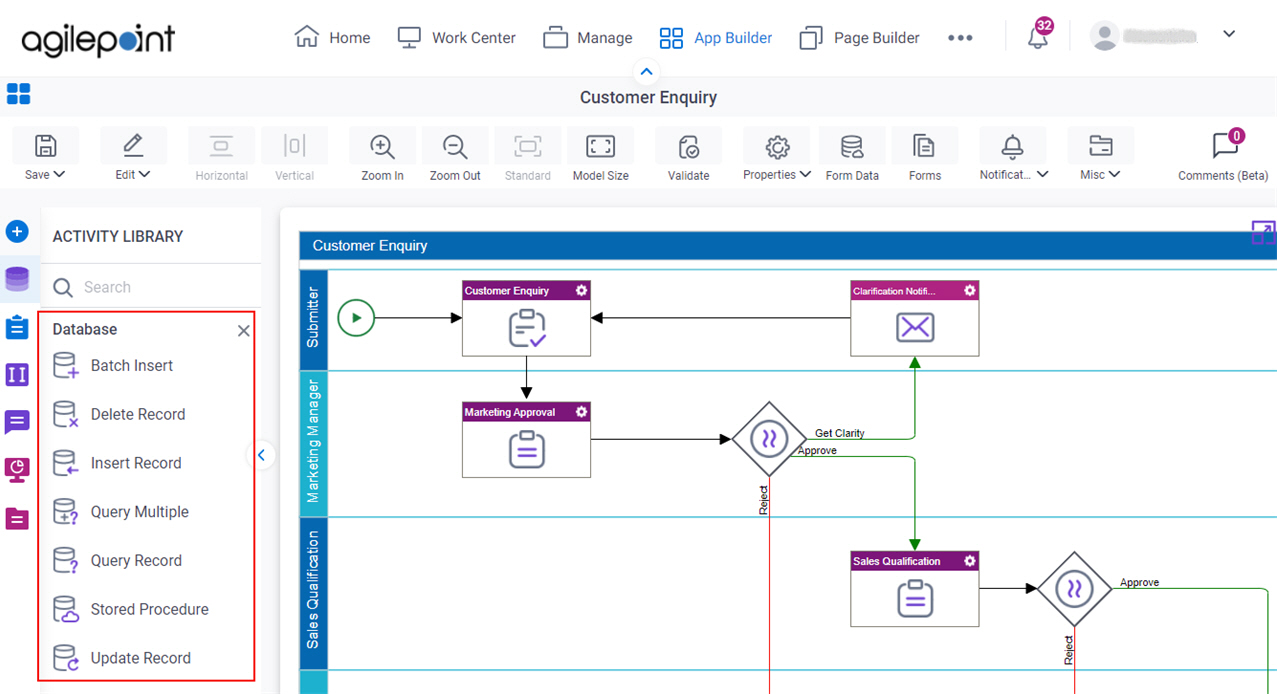
The following activities are available for databases:
- Batch Insert
- Delete Record
- Insert Record
- Query Multiple
- Query Record
- Stored Procedure
- Update Record
For more information, refer to the process activities for database in Process Builder.
Lookups in eForm Builder
You can create lookups for SQL Server databases in eForm Builder and form-based apps.
A lookup is an automated procedure that retrieves data from an external data source, such as a database or third-party service, to display runtime. For example, you can use a lookup to populate the options in a list on an eForm.
For more information, refer to Database Auto-Lookup configuration.
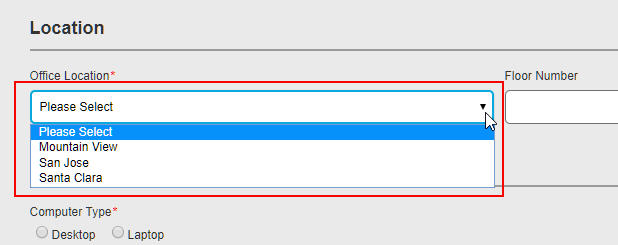
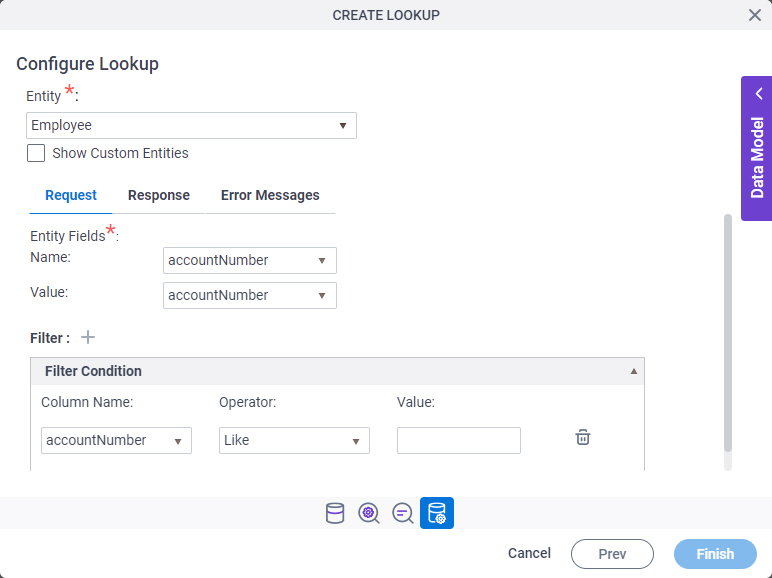
This image is only one example configuration screen from the Auto-Lookup form control. It does not show all the configuration options, and lookups can be configured and executed in multiple ways. The Auto-Lookup control can perform a lookup for eForms or other controls. However, many other form controls have built-in lookup capabilities — for example, the Drop-Down List form control. For information about how to configure lookups, refer to eForm Controls.
Data Source for Process-Based Apps
You can use SQL Server as a primary data source for your process-based app. A primary data source provides a default data model for your app.
For more information, refer to Process-based app data source.
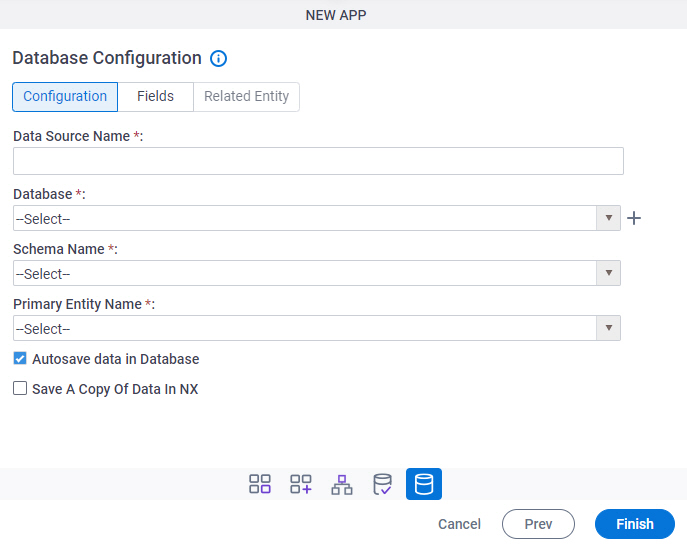
Data Source for Form-Based App
You can use a database in SQL Server as a primary data source for your form-based app. A primary data source provides a default data model for your app.
For more information, refer to Form-Based App with a Database Table (Classic).
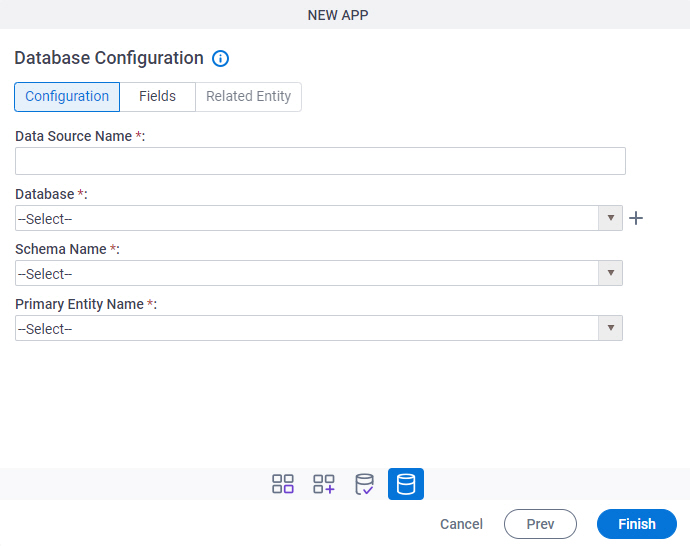
AgilePoint Databases
Microsoft SQL server is the data storage mechanism for AgilePoint NX.
| Component | Database Name (Suggested but Optional) | Database Optional for Component? | Function |
|---|---|---|---|
|
AP_Workflow_DB |
No |
Stores application data in AgilePoint NX. This is the main AgilePoint NX database. | |
|
Data Entities |
AP_Data_Entities_DB |
No |
Stores the data for the Data Entities component in AgilePoint NX. |
|
Portal Master |
AP_Portal_Master_DB |
No |
Stores overall information for all AgilePoint NX Portal tenants. |
|
Portal Tenant |
AP_Portal_Tenant_DB |
No |
Stores non-workflow data for an AgilePoint NX Portal tenant. |
|
Data Services |
AP_Data_Svcs_DB |
Yes |
An AgilePoint server-side application that stores data you want to track and report in AgilePoint processes After your installation is complete, if you want to use advanced mode, create a table that is named based on the application, and create the table columns based on the fields from the form. The Primary Key should be the process instance ID (type varchar 50). |
|
Report Center |
AP_Reports_DB |
No |
The database for Report Center data. Note: The Report Center component (sometimes referred to as AgileReports) can only be used by customers who purchased this component before April 1, 2020. This version is no longer available for purchase, including by current and previous purchasers of AgilePoint NX or the Report Center component. In AgilePoint NX v8.0 and higher, Report Center has been replaced with the
Analytics Center component.
|
Automated Actions Based on Database Events (Event Service)
AgilePoint NX apps can take automated actions when data is added to a SQL Server database. For example, a process-based app can start based a new row added to the specific database table. These actions use the Database Insert event service.
For more information, refer to Add New Event Service Screen > Database Insert Screen.
Access Tokens
You can create access tokens for Microsoft SQL Server.
An access token is a secure object that stores an endpoint (usually a URL) and authentication credentials to connect to a service or technology. Often this is an external or third-party service, like Salesforce or SharePoint, but access tokens can also connect to an AgilePoint NX enviornment, local database, or other types of technologies. Once an access token is created, app designers can simply select and reuse it, rather than entering the credentials each time they are needed.
For more information, refer to Access Token for Database.
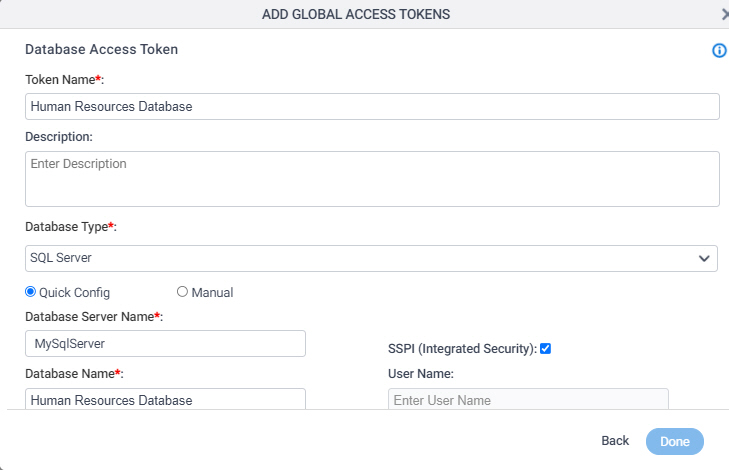
Related Topics
- Database tab - Process activities
- Database - Process Builder procedures
- Database Auto-Lookup configuration
- Access Token for Database
- Database screen - AgilePoint Server Configuration
- DBSyncModule Extension - AgilePoint Server Configuration
- I Need Help with the AgilePoint Database - Troubleshooting
- AgilePoint Data Services Requirements
- AgilePoint Database Schema
- Create Databases for AgilePoint
Microsoft SQL Server Documentation
Use these links to find third-party vendor documentation for Microsoft SQL Server:
About This Page
This page is a navigational feature that can help you find the most important information about this topic from one location. It centralizes access to information about the concept that may be found in different parts of the documentation, provides any videos that may be available for this topic, and facilitates search using synonyms or related terms. Use the links on this page to find the information that is the most relevant to your needs.
Keywords
database, Oracle, MySql, SqlServer, Sql Server, storage, data store, table, column, workflow database, workflow db, reports database


